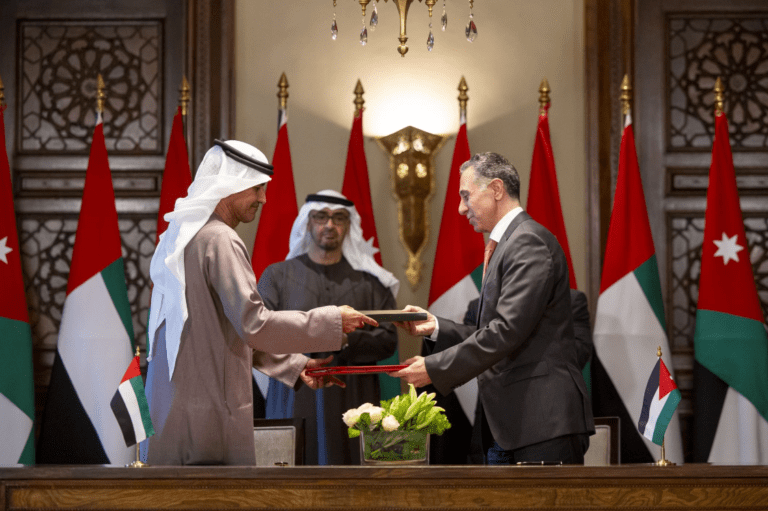In a significant step towards deepening regional cooperation, the UAE and Jordan have signed a Comprehensive Economic Partnership Agreement (CEPA), marking the first such agreement between the UAE and an Arab nation. The agreement was signed in the presence of UAE President His Highness Sheikh Mohamed bin Zayed Al Nahyan and Jordan’s King Abdullah II bin Al-Hussein during a ceremony at Basman Palace in Amman.
The CEPA aims to enhance bilateral trade, boost investment, foster job creation, and strengthen supply chains in key industries. The agreement was signed by Dr. Thani bin Ahmed Al Zeyoudi, the UAE’s Minister of State for Foreign Trade, and His Excellency Yarub Falah Al-Qudah, Jordan’s Minister of Industry, Trade and Supply.
Additionally, Sheikh Mohamed bin Zayed and King Abdullah II witnessed the signing of an Administrative Cooperation Agreement on Customs Matters. This second agreement, designed to streamline customs processes between the two nations, was signed by His Excellency Ali bin Hammad Al Shamsi, Chairman of the Federal Authority for Identity, Citizenship, Customs, and Ports Security, and Jordan’s Minister Yarub Falah Al-Qudah.
Strengthening Economic Integration
Sheikh Mohamed bin Zayed praised the CEPA as a natural extension of the longstanding UAE-Jordan strategic relationship. He emphasized that the agreement provides a strong foundation for future cooperation and deeper economic integration between the two nations. “It paves the way for more fruitful partnerships and long-term trade and investment collaboration, contributing to sustainable economic growth for both nations and fostering prosperity across the region,” he said.
King Abdullah II expressed optimism about the new partnership, highlighting the agreement’s potential to achieve shared goals of sustainable economic development. “The CEPA will open new doors for economic integration between our nations and contribute to the shared vision of prosperity and growth,” he stated, while acknowledging the UAE’s ongoing support for Jordan’s development efforts.
Growing Trade and Investment Relations
The agreement builds on strong existing economic ties between the UAE and Jordan, with non-oil trade surpassing US$4.2 billion in 2023. In the first half of 2024 alone, non-oil trade between the two countries reached $2.7 billion, reflecting a 36.8% increase compared to the same period in the previous year. Jordan is currently the UAE’s third-largest Arab trade partner outside the GCC, while the UAE remains Jordan’s largest foreign investor, with mutual investments estimated at around $22.5 billion.
By easing trade restrictions and reducing non-tariff barriers on goods and services, the CEPA is expected to drive further collaboration in sectors such as renewable energy, manufacturing, transport, pharmaceuticals, and food processing.
Part of UAE’s Broader Economic Strategy
The UAE’s CEPA programme is a critical component of its broader economic growth strategy, focused on expanding global trade relations by reducing barriers, improving market access, and encouraging greater private sector investment. This latest agreement with Jordan is expected to accelerate progress towards these goals while enhancing economic ties across the region.


